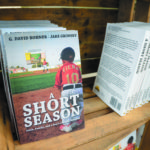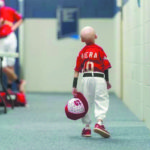Jake Gronsky’s life changed completely with the sickening crack of a 95-mile-per-hour two-seam fastball shattering the third metacarpal of his left hand.
“The umpires heard the sound coming off my hand and called it a foul ball. The crack was so loud they thought it was the wood,” the Danville graduate remembered of the incident from August 2016. “We showed them my hand, which was now a black balloon, but it didn’t change the call.”
Gronsky pleaded at the hospital for them to not cast the injury — he wanted to finish out the season riding the momentum of the hottest month of his young career, batting .317 with a .391 on base percentage.
“Legally, I was overruled,” he said, ending a season played between two St. Louis Cardinals minor league clubs — the Class A Peoria Chiefs and the High-A Palm Beach Cardinals.
“The end of the season is critical for minor league players. It is when you win jobs for the next year,” Gronsky said. “Playing professional baseball is all I wanted to do — and all I trained to do — from the age of 2. I was always trying to prove my worth on the diamond every step of the way. It really is the mindset of a minor league player — it’s always about the next step.”
Because of his Central Pennsylvania roots, Gronsky was sent to the St. Louis Cardinals’ Class A Short Season affiliate State College Spikes for a two-day stint to meet with the doctor and try to pick up the pieces of a shattered season.
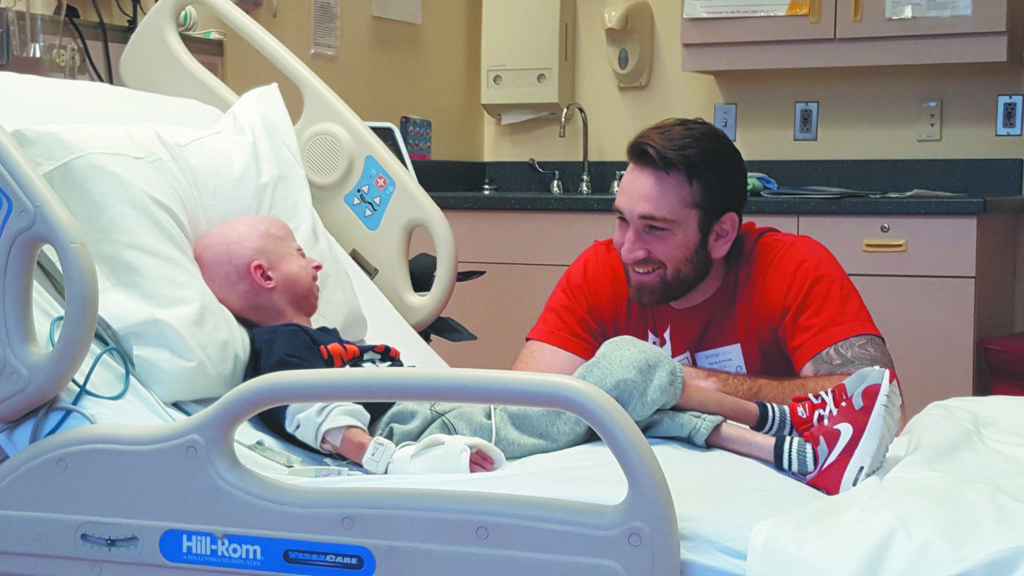
Tragedy into miracle
Standing just a few inches taller than a standard Major League baseball bat, the 37-inch, 22-pound Josiah Viera is no average 13-year old.
But it isn’t his size that defines the young baseball enthusiast from Hegins — or the extremely rare Hutchinson-Gilford Progeria Syndrome that ages his body at an accelerated rate.
“I don’t know what it is that draws so many to Josiah,” said his grandfather, David Bohner. “God put something special in this young man — a spirit that has helped him fight through things most people can’t imagine. He just doesn’t give up.”
A few months after his first birthday, Josiah was a regular fixture at the Janet Weis Children’s Hospital at Geisinger. A feeding issue and subsequent infection ravaged his frail body. He slipped into a coma and over time, despite the best efforts of the medical staff, it appeared that there was no chance of return for Josiah. His mother, Jen, made the agonizing decision to take him off his ventilator and waited for his inevitable death.
However, he miraculously survived.
“He was alive. With no plausible explanation, he was alive,” said Bohner. “We tried to remain calm and realistic, but all I could do was hold onto a comment from one of his nurses: ‘God’s not done with him yet.’”
Well aware that Josiah’s Progeria diagnosis is incurable — average life expectancy is eight to 13 years — his family made a commitment to fill whatever life he had left with quality over quantity.
At a young age, Josiah developed a fascination with the game of baseball, and while they knew it was risky, the family allowed him to get involved with the Tri-Valley Little League program near Hegins. Josiah’s story was picked up by ESPN via a 30-for-30 video special. A few years later, in 2013, the Children’s Miracle Network invited Josiah to attend a State College Spikes game.
His miraculous story and passion for the game resonated with the team in ways they never expected, and before long, Josiah had been adopted as an honorary bench coach for the team, inspiring the squad to two New York Penn League championships and touching the lives of numerous minor league players.
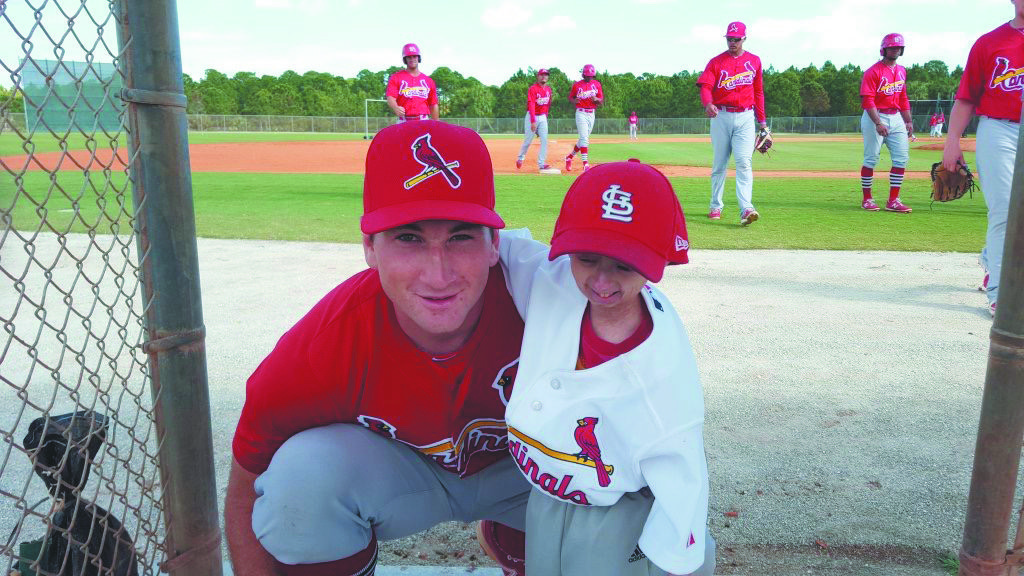
Fateful encounter
Gronsky had connections with a few of the State College Spikes at the time of his two-day medical stint in late August 2015 — including then-manager Johnny Rodriguez and two old teammates, Michael Pritchard and Mike Massi.
“I walked into the clubhouse, and after showing them the cast and explaining the season, I could see their shoulders slouch and hearing their same disappointment of how my much-needed hot steak came to an abrupt end,” Gronsky remembered. “Suddenly, a little boy walked in to play home run derby in the clubhouse, and the atmosphere changed drastically.”
Like many of the minor league players connected to the Spikes, Gronsky was immediately drawn to Josiah’s unexplainable bubbly personality along with his unfiltered joy for the game.
“Jake shows up on rehab assignment in State College, and we started talking pretty quickly,” said Bohner. “He said he was from Danville, and I shared that Josiah goes to the hospital there.”
The connection continued into Spring Training 2016.
“Dave and I started talking. His granddaughter always had wanted to take dance lessons, and my mom has a dancing school. I got to know Josiah and the family well,” Gronsky said. “My hand healed very quickly. I went to spring training and had a very good spring, but in the last week of spring training, I was one of the team’s last cuts.”
For someone who had invested his whole life into baseball, the realization was hard to take at first.
“I knew if I ever got cut, I’d be a wreck, and in some ways I definitely was,” Gronsky said. “However, I knew I did everything I could. There wasn’t an ounce of me that I didn’t spend toward baseball. However, I didn’t know what was left. I had dedicated everything to the game. I was in a time capsule with no internships or worthwhile things on my resume.”
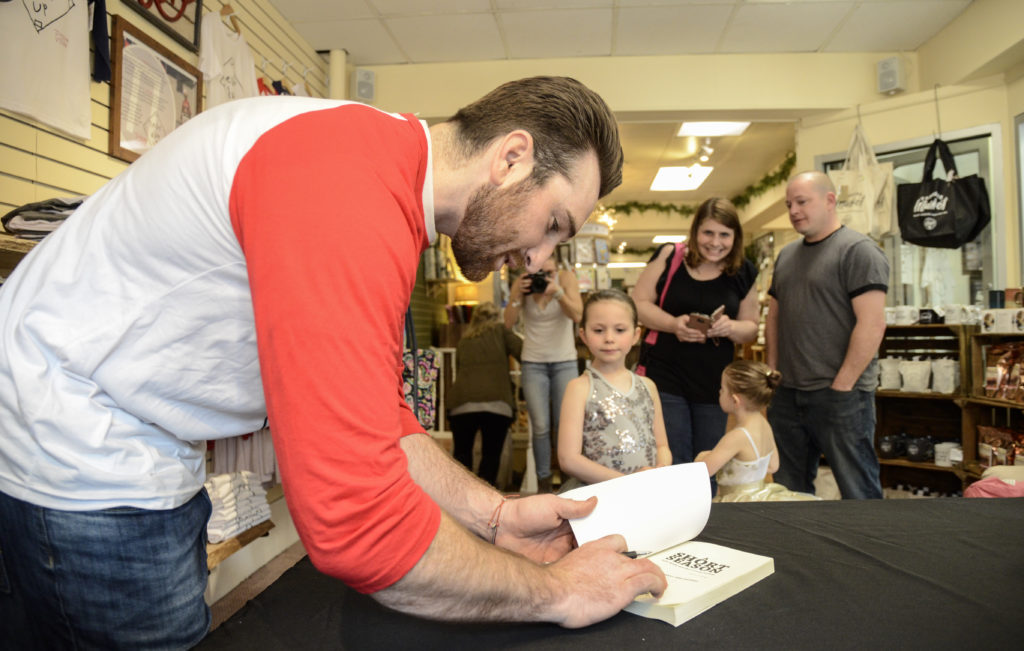
Gronsky moved back with his parents in Danville while re-assessing his future.
“Dave started guiding me around that time. I only saw myself as a baseball player and now that was over,” Gronsky said. “Dave started sharing his life, his family’s life and his testimony. It was the thing I needed exactly at that time.”
Then, one day while talking at a local coffee shop, the two starting talking more about Josiah’s miraculous story and the impact he was having on the game of baseball throughout the St. Louis Cardinals’ organization.
“Dave said he didn’t want Josiah’s life to be forgotten. I told him to consider all the lives Josiah had impacted and that he would never be forgotten, but Dave pointed out that if it wasn’t written down, it would fade away over time,” Gronsky said. “Right away, I said that we needed to do it. I had done some writing while in college at Monmouth.”
Bohner said he clearly remembers Gronsky’s reaction to the idea.
“It looked like he had just hit a grand slam. He immediately said he wanted to help,” Bohner recalled. “We talked about just writing the story for ourselves. We were going to print it out and make up two nice copies at the local Staples that we’d be able to get out down the road and look back on.”
Gronsky and Bohner met numerous times, with Bohner sharing not just Josiah’s story, but his own personal tale of abuse and eventual forgiveness and redemption that was sparked by Josiah’s presence in the extended family’s life. Gronsky included stories from minor leaguers who have been forever impacted by Josiah’s therapeutic effect on the Spikes organization, including one player’s struggles with his mother’s breast cancer diagnosis and how Josiah inspired him.
“We tried to make it as close to the bone as possible. It was never intended to go beyond copies for each of us,” said Gronsky. “But Ben Houser with ESPN heard about the project and encouraged us to get it published. The idea was to impact those around us, so we decided to try.”
The process wasn’t easy.
“We were unknown authors, and we received numerous rejections when we received a call from Sunbury Press out of Mechanicsburg. They wanted to get it out there for us,” Gronsky said.
The book, “A Short Season: Faith, Family and a Boy’s Love for Baseball,” was released in March and immediately became Sunbury Press’ best seller for the month.
“I don’t know what the story will do, but part of me doesn’t care,” Gronsky said. “The goal was tell an honest story that can live beyond any of us — and I feel we did just that.”
The process — with Josiah and his boundless optimism and passion for the game at its center — has given Gronsky a new direction in life.
“Dave was approached numerous times by more accomplished writers about this story, but the fact that he trusted me, an ex-ball player, with his one shot at this story means more to me personally than anyone will ever know,” Gronsky said. “It has given me the confidence I need to pursue this. I hope to continue sharing inside stories from the baseball diamond that aren’t already being told.”
He is already on his next project. After sending a rough draft of Josiah’s story to longtime friend and 2006 World Series Most Valuable Player David Eckstein for feedback, Gronsky received an interesting call from Eckstein.
“He said he had wanted to write a book about his personal story, and when he saw what I did with Josiah’s story, he wanted to partner with me for his own book,” Gronsky said. “He was my favorite player when I was a kid, with one of his jerseys hanging in my closet and one of his posters on my wall. Next thing I know, he’s booking a flight to Orlando to work with him.”
Gronsky said the first manuscript is done for that book, and he expects it to be published sometime in 2019.
Regardless of where Gronsky’s writing career takes him — he admits he will not forget how it all started.
“I thought my whole life that I was destined to be a major league player,” he said. “But if my entire professional baseball career was setting me up for this — the broken hand, meeting Josiah and ultimately telling these stories from the diamond, then it was worth the ride the entire way.”
For more information about “A Short Season: Faith, Family and a Boy’s Love for Baseball,” visit www.sunburypress.com




